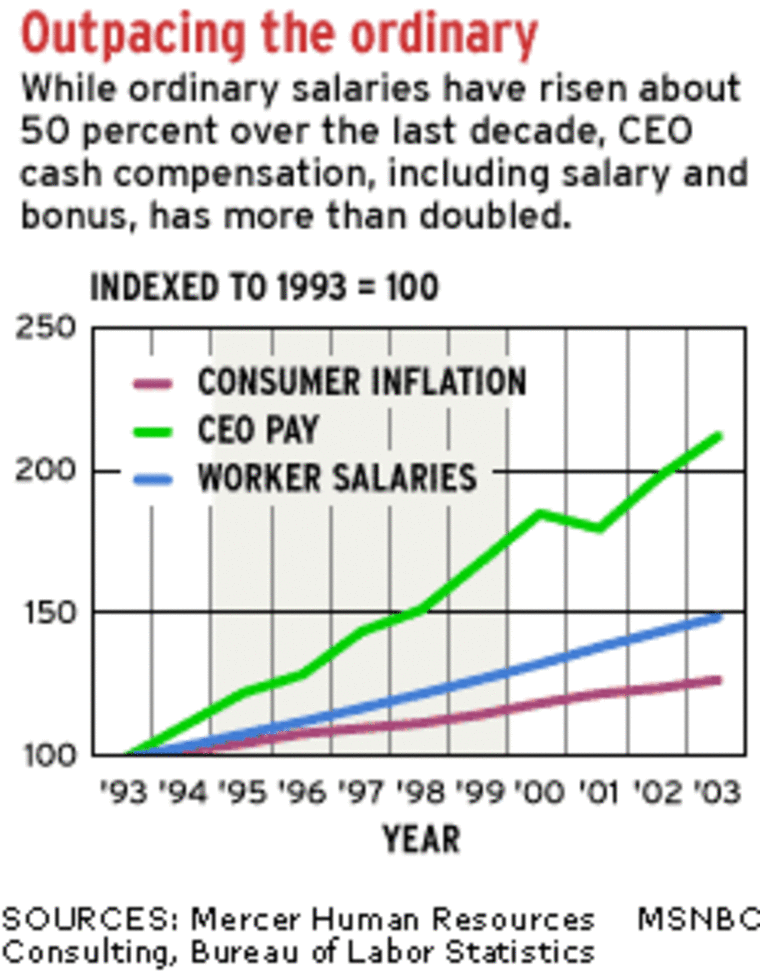Total compensation for chief executives of the nation’s biggest companies fell slightly last year, but save the hankies. After a year that saw a surge in corporate profits and stock prices, hundreds of elite executives are reaping the rewards in the form of salary increases and sharply higher bonuses.
Only the issue of long-term compensation clouds the picture, as companies slowly change the incentives they offer to top executives.
In the 1990s, stock options were all the rage, allowing some executives and even lower-level employees to get fabulously wealthy in the bull market. But in the aftermath of a wave of scandal and outrage over lucrative compensation packages, corporate boards are shifting away from options to longer-term grants of stock and cash.
For senior executives of big companies, long-term compensation is crucial, generally accounting for two-thirds of total pay. But the value of long-term compensation packages can be hard to measure.
“The biggest message this year is that there is really flux in terms of pay,” said Paula Todd, an executive compensation consultant with Towers Perrin. “There are more people changing their mix and changing a lot of different things.”

She and other executive compensation experts agree that cash compensation for chief executives generally went up last year, reflecting the strong performance of many companies.
According to a study of 350 large companies released by Mercer Human Resources Consulting, the median total cash compensation for CEOs last year, including salary and bonus, was $2.1 million, up 7.2 percent. But total compensation, adding in the estimated value of long-term incentives like stock options and restricted stock grants, was down 4.1 percent at a median of $6.2 million.
Other studies reached similar conclusions. Towers Perrin, which studied 900 companies, found that base salary for CEOs rose 8 percent and bonuses for 2003 performance rose 15 percent, reflecting the generally strong year. But the value of long-term incentive payments fell 13 percent, so total compensation was lower.
Both studies excluded the value of options granted in previous years but exercised in 2003. Such option sales account for the most spectacular pay packages, but many compensation experts believe it is unfair to consider them as part of annual pay since they represent the appreciation of assets typically granted over many years.
The bull market in stocks last year triggered a burst of such option sales that accounted for some of the biggest pay packages, including the $141 million for Reuben Mark of Colgate-Palmolive and $70 million for George David of United Technologies. The two executives were among the leaders in an annual Wall Street Journal pay survey. The other top ranking executive was Steve Jobs of Apple Computer, who received compensation valued at $75 million, but entirely in the form of restricted shares.
When option sales are added back in, CEO pay actually rose 5.2 percent last year, according to a BusinessWeek analysis of proxies from 252 large companies.
Publicity about big pay packages is an annual rite of spring, when companies publish proxy statements detailing how they compensate top executives. What is new this year is an evident shift away from stock options in favor of restricted stock and other forms of long-term compensation.
“There has been a significant slowdown in the last year year and half in the use of options,” said Mike Halloran, a senior executive compensation consultant with Mercer. “The proportion of pay that comes from cash vs. stock is going to be higher than it has been for the past five or six years or so.”
Of the 50 biggest blue-chip companies studied by Towers Perrin, eight decided last year to eliminate options altogether, and five decided to reduce the number of options granted. In most cases options will be replaced with restricted stock that vests over time.
The reputation of stock options has suffered mightily since the stock market collapsed in 2000. Executives at scandal-plagued companies like Enron and WorldCom were accused of misrepresenting their financial results so they could cashed in options at inflated levels.
Austan Goolsbee, an economics professor at the University of Chicago who studies compensation issues, said it is natural for companies to want to shift away from an unpopular compensation vehicle but unfair to blame corporate scandals on stock options.
After all, if individuals are determined to defraud investors, it hardly matters whether they cash in using stock options or some other method. And, he adds: “The vast majority of companies never did anything wrong.”
But the tide is clearly running against stock options, said Todd.
The Financial Accounting Standards Board has proposed a new rule that would require companies to count options as a business expense beginning next year. Already several companies that had distributed options widely to employees, including Microsoft, have ended the practice. Others have sharply limited their use of options, responding to shareholder concerns about earnings dilution.
“Investors have just done a 180-degree turnaround on this subject,” said Todd. For example TIAA-CREF, which controls some $50 billion in pension funds, recently issued guidelines suggesting that companies should stress restricted stock awards rather than options.
“Stock options should be awarded judiciously, if at all,” TIAA-CREF said in its guidelines.
That statement carries a lot of weight with corporate boards, said Todd.
“It used to be that investors thought restricted stock was just the worst way you could pay,” Todd said.
She and others are concerned that in the rush to distance themselves from stock options, corporate boards may be shifting toward compensation plans that discourage risk-taking. A restricted stock award may not be potentially as lucrative as stock options, but it’s a sure thing for executives who stay in their posts for the requisite vesting period.
Todd suggests that companies use a mix of stock options and longer-term stock grants to encourage executives to act in the best interest of shareholders.
“Both extremes have their own set of issues, and I don’t think either extreme is where you want to be,” she said.